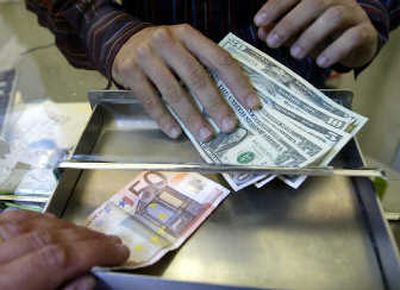The euro’s growing dominance

PARIS – Despite squeals of pain from European exporters, the strength of the euro is fast propelling Europe’s single currency into a juggernaut.
Currency traders from Egyptian street hawkers to Asian central banks are looking to the euro as a better store of value as the U.S. dollar erodes. The shared 13-nation currency hit $1.4966 on Friday, yet another record high against the once steadfast dollar.
As well as being the world’s currency of choice in central bank reserves, the dollar has long been the de facto second currency in street markets and on tourist menus around the world.
Today, market traders in Luxor – site of the ancient Egyptian city of Thebes – snub dollars in favor of euros or local currency. In Russia, shops, restaurants and hotels that once listed prices in the mighty dollar rather than the unstable ruble have increasingly pegged prices to the euro.
While these trends are unlikely to perturb currency markets, concern is growing that foreign investors may start dumping their dollar-holdings. In particular, traders are watching China’s central bank for changes in its portfolio.
Most of China’s $1.43 trillion reserves are in dollar-denominated assets such as U.S. Treasuries, and officials aren’t happy about the U.S. currency’s decline. Zhou Xiaochuan, head of China’s central bank, urged U.S. Treasury Secretary Henry Paulson on Thursday to boost the dollar, according to the Xinhua government news agency.
The euro – introduced to financial markets in 1999 and in notes and coins form in 2002 – has risen as a share of global official reserves from 17.9 percent in 1999 to 25.8 percent in 2006, according to the International Monetary Fund. In the same period the dollar’s share has fallen from 71 percent to 64.8 percent.
The dollar’s reserve-currency status confers important benefits to the U.S. – such as being able to borrow in its own currency and making life easier for exporters. Earlier this month Paulson defended the U.S. position.
“The dollar has been the world’s reserve currency since World War II and there is a reason,” he told Treasury reporters. “We are the biggest economy in the world.”
Yet the 13-nation region is catching up with the U.S. Its economy will expand to $12.6 trillion (8.49 trillion euros) next year, only just behind the $14.3 trillion (9.63 trillion euros) U.S. economy, according to IMF estimates.
The dollar has been falling against the euro and other currencies as fears about the health of the U.S. economy have been stoked by the mortgage crisis that has tripped up borrowers and caused a credit crunch among banks.
Fears over the huge U.S. trade deficit, which leaves more dollars in the hands of foreigners, have also weighed on the currency.
Yet talk of the dollar’s demise has been exaggerated, according to Paul de Grauwe, once a candidate for a European Central Bank board seat and economics professor at Leuven university in Belgium. Dollar weakness in the 1980s led to a similar debate, he said.
“There was talk then about other currencies replacing the dollar but it never happened,” he said. “In the future, the euro will decline.”
For the moment, the euro is definitely up – bad news for Europe’s exporters.
Planemaker Airbus has been pummeled by a slumping dollar, the currency in which planes are priced, against a corresponding rise in the euro – in which it pays most of its costs.
Chief executive Thomas Enders said the euro has now “crossed the pain threshold.” The rate of the dollar’s fall “is life threatening,” he was quoted by Der Spiegel magazine as saying Thursday.
Still, the stronger euro confers benefits as well, holding down energy prices and inflation. And its strength reflects rising confidence in the euro zone and the global prospects of an economically unified Europe.
“There is a renewed self-confidence on the European continent,” said Holger Schmieding, chief European economist at Bank of America.
“A strong euro shows that people around the world think that the euro economy isn’t as weak as they once thought. And it shows that people think the ECB is doing a good job.”
Such pride may be behind the rethink by the skeptical Danes and Poles, whose leaders announced this week they might be ready for the euro.
The euro entered circulation in 12 EU countries in 2002. At the time, Denmark, Britain and Sweden were the only EU members to stay outside.
After the bloc expanded in 2004, Slovenia has adopted the currency, while Cyprus and Malta will start using the euro on Jan 1, 2008.